
Pac-Man Vs. is a 2003 maze video game developed by Nintendo and published by Namco for the GameCube. In the game, one player takes control of Pac-Man, who must eat all of the pellets in the maze, while the others control the ghosts to try to catch them. The objective is to be the first to reach a set number of points, selected before the game begins. The player controlling Pac-Man uses the Game Boy Advance to play, while the others use the television to control the ghosts. The game requires the GameCube - Game Boy Advance link cable in order to play.

Mr. Driller Drill Spirits is a 2004 puzzle video game developed and published by Namco for the Nintendo DS. Controlling one of six characters, the player must make it to the bottom of each stage by destroying, colored formations of blocks while preventing their oxygen meter from depleting. Multiple different gamemodes are present, including a single-player campaign, a time-attack mode, and a competitive multiplayer mode. It is the sixth entry in the Mr. Driller series.

Meteos is a 2005 tile-matching video game developed by Q Entertainment and published by Bandai for the Nintendo DS. It was produced by Q Entertainment founder Tetsuya Mizuguchi and designed by Masahiro Sakurai. Meteos was inspired by the video game Missile Command (1980), the film The Matrix (1999) and the television series 24 (2001-2010).

Kirby: Canvas Curse, known in Europe as Kirby: Power Paintbrush, is a platforming video game developed by HAL Laboratory, published by Nintendo for the Nintendo DS and released in 2005 and is the first Kirby game to be released for the system. While Kirby: Canvas Curse is a platformer, it does not play like a traditional Kirby video game, as it solely requires the use of the stylus. A Wii U sequel, Kirby and the Rainbow Curse, was released on January 22, 2015 in Japan, February 20, 2015 in North America, May 8, 2015 in Europe, and May 9, 2015 in Australia. The game was later re-released for the Wii U's Virtual Console in Europe and Australia in December 2015, in Japan in February 2016, and in North America in October 2016.
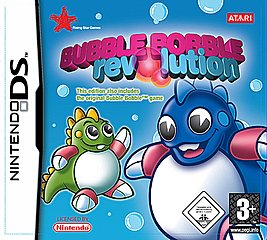
Bubble Bobble Revolution is a 2D platform game for the Nintendo DS. Developed by Dreams, it was released in Japan on 24 November 2005 by Taito as Bubble Bobble DS, in Europe on 2 December by Rising Star Games (distribution handled by and in North America on 3 October 2006 by Codemasters.

SpongeBob SquarePants: The Yellow Avenger is a SpongeBob video game developed by Tantalus Media and published by THQ for Nintendo DS and PlayStation Portable. It is the first SpongeBob game to be released on both consoles.
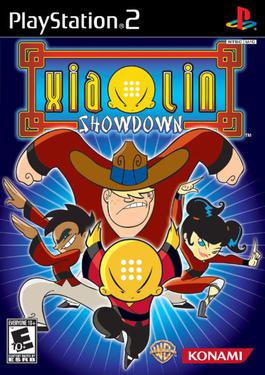
Xiaolin Showdown is a beat 'em up and fighting video game based on the animated television series of the same name. It was released for the PlayStation 2, PlayStation Portable, and Xbox on November 14, 2006, in North America and in Europe on June 29, 2007. The game was later ported over to the Nintendo DS on November 28, 2006, in North America and in Europe in February 2007. Players are able to play as the Xiaolin Apprentices. The game can be played with up to four players locally.

Over the Hedge is a platform video game with stealth elements developed by Vicarious Visions and published by Activision for the Nintendo DS handheld video game console. It was first released in North America, and was later released in Europe. The game is set immediately after the events of the DreamWorks movie Over the Hedge, just like its adaptations on consoles.
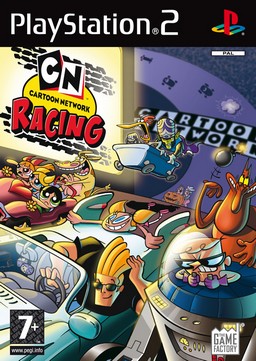
Cartoon Network Racing is a racing video game developed by Eutechnyx for PlayStation 2 and Firebrand Games for Nintendo DS, published by Danish video game developer The Game Factory, and released on December 4, 2006, in North America, and on February 9, 2007, in Europe. The gameplay is similar to Nintendo's 2003 game Mario Kart: Double Dash, but the characters and racetracks are all from six of Cartoon Network's original animated television series: Courage the Cowardly Dog, Cow and Chicken, Dexter's Laboratory, I Am Weasel, Johnny Bravo, and The Powerpuff Girls.

M&M's Kart Racing is a racing video game for the Nintendo DS and Wii, based on the M&M's license and developed by Frontline Studios in co-production with Calaris Studios. Both studios responsible for this game’s development were headquartered in Poland. It is the 5th of the 7 M&M's video games. The game allows players to play as one of the M&M's Spokescandies on 15 race tracks. The game was widely panned upon release.
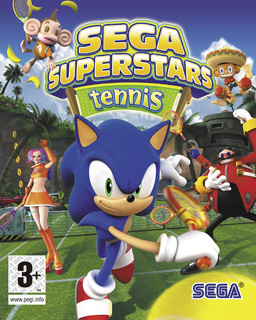
Sega Superstars Tennis is a sports video game developed by Sumo Digital and published by Sega. It is the second title in the Sega All-Stars series, preceded by Sega Superstars (2004), and crosses over characters, locations, and soundtracks from several Sega franchises, including Sonic the Hedgehog, Space Channel 5, and Super Monkey Ball.

Skate It is a skateboarding video game developed by EA Black Box, EA Montreal, and Exient Entertainment for the Nintendo DS, Wii, and iOS. The game is a spin-off of 2007's Skate and was released in 2008.

Dragon Ball: Origins, known as Dragon Ball DS in Japan, is a video game for the Nintendo DS based on the Dragon Ball franchise created by Akira Toriyama. The game was developed by Game Republic and published by Atari and Namco Bandai under the Bandai label. It was released on September 18, 2008 in Japan, November 4, 2008 in North America, December 5, 2008 in Europe, and December 11, 2008 in Korea. The game was released in Australia on December 4, 2008, but was later recalled as its PG rating did not reflect the "racy" content found in the game and was subsequently given a higher rating.
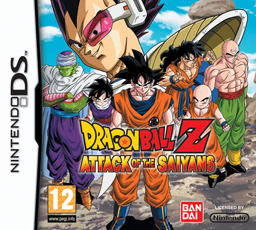
Dragon Ball Z: Attack of the Saiyans, known in Japan as Dragon Ball Kai: Saiyan Invasion, is a video game based on the Dragon Ball franchise for the Nintendo DS. It was released in Japan on April 29, 2009, and in Europe and North America in November 2009. The game is developed by Monolith Soft and distributed by Namco Bandai in North America ; it is one of the first games in the Dragon Ball franchise to be published by Namco Bandai, as the company would acquire the license from previous holder Atari in July of the same year.

Dragonball Evolution is a fighting video game for the PlayStation Portable based on the live-action film of the same name. The game was released in March 2009 in Japan, followed by a North American release on April 8, 2009. It is the first Dragon Ball video game to feature Bulma as a playable character.

Command and Destroy is a real-time strategy video game developed by Cypron Studios and published by Destination Software Inc. and Zoo Digital Publishing for the Nintendo DS.

Harlem Globetrotters: World Tour is a basketball sports video game developed by Full Fat and DSI Games, and published by DSI Games and Zoo Digital Publishing. It was released for the Game Boy Advance on October 2, 2006 and for the Nintendo DS on March 7, 2007.

Sudoku Mania is a 2006 sudoku puzzle game developed by Frontline Studios and published by UFO Interactive Games. Released on June 30, 2006, Sudoku Mania received "generally unfavorable" reviews from critics, having a score of 25 out of 100 on review aggregator Metacritic. Critics criticized the game's controls for being "disappointingly" "simplistic" and "obtuse".

Toon-Doku is a 2007 sudoku puzzle video game developed by Dragon's Den Unlimited and published by Majesco Entertainment for the Nintendo DS. Directed by Joseph Sutton, the game was first released in North America and Europe in April 2007, with an Australian release following in October later the same year.
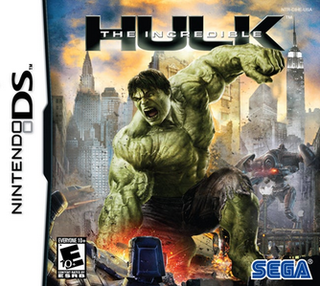
The Incredible Hulk is a 2008 video game published by Sega and developed by The Fizz Factor for the Nintendo DS. It is based on the film of the same name, following scientist Bruce Banner as he traverses across the Americas in search of a cure to a condition that transforms him into a monstrous being known as the Hulk. Unlike the console game that was concurrently developed and released by Edge of Reality, The Incredible Hulk is presented as a side-scrolling platformer rather than an open world action-adventure title.


















